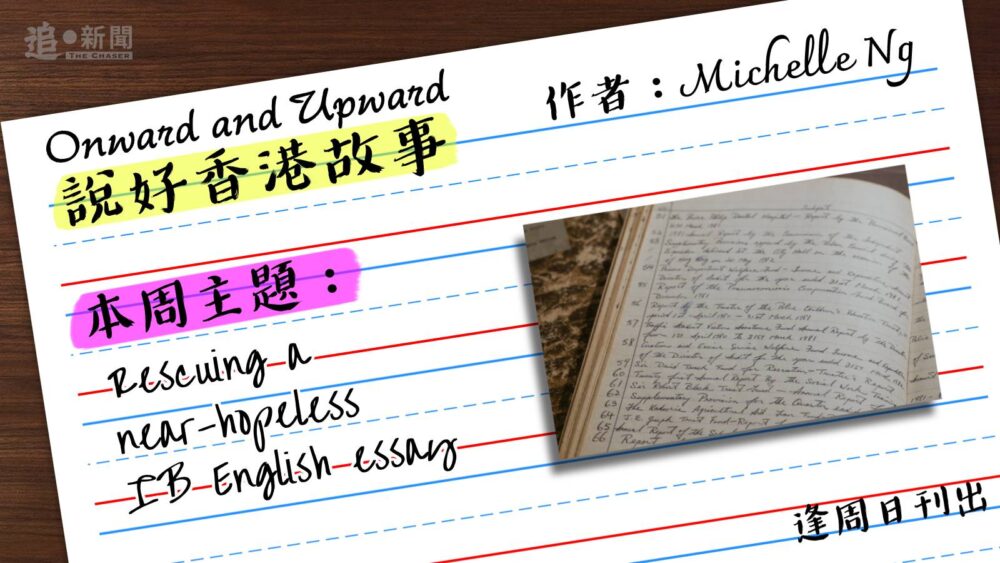
A student who sat for her International Baccalaureate English exam wrote the following essay for its writing segment. For ease of reference, I’ve numbered the paragraphs in her piece.
The writing topic she was given:
“The best way to understand the true nature of society is to study its dominant trends in art, music and fashion.” To what extent do you agree with this statement?”
報道無罪 知情有價 請即訂閱《追新聞》:
https://www.patreon.com/thechasernews
Her response and my comments on it:
1. Society, as composed of thousands of living units, constantly changes due to the various external and internal factors. This is why establishing a solid view of one society can be a daunting task. Some people support the statement that the best way to understand the true nature of society is to study its dominant trends in art, music and fashion, but I have to strongly disagree with this opinion.
Comment
Since this question doesn’t require the candidate to deny outright the value of art, fashion and music in facilitating our understanding of society, it’s probably a strategic mistake for her to adopt such a strong stance (“strongly disagree with this opinion”); unless she can back her position with very convincing arguments, she will fail to meet the stringent standard she has (needlessly) set for herself.
2. First of all, art cannot be functionalised in such manner. Treating it as a potential data base would devalue the art itself. This means, that insistent pursuit of finding knowledge about the outside world in paintings or music increases the risk of trivialised interpretations of them, what frequently happens even without such approach.
Comment
As a general rule, students should always present their most persuasive argument first – always remember you never get a second chance to make a first impression. By this measure, this second paragraph is a disaster. Taken as a whole it is barely intelligible. Its reasoning is also weak: just because one believes art should be appreciated for its own sake doesn’t mean it would be against one’s scruples to use artistic trends to make out the values of a nation at a particular point in time.
Unfortunately, we have to wait till the candidate’s concluding paragraph to see ideas of substance. So, her problem lies not so much in her lack of good viewpoints as in her lack of good planning. My guess is she was probably suffering from a bad case of nerves. The thing about writing essays in a high-pressure setting, however, is the more jittery you are, the more you should spend time coming up with a good outline, because with a road map in hand you’ll be calmer.
3. Another argument against the art as a source of information is that it may reflect an overall image, but does not explain the reasons – one can hear that the song being played is sad, but does not know whether it is a collective sadness of group of people, or maybe it is just the singer that had lost his relative and now suffers from a severe depression.
4. On the other hand, art, the mean of expression as old as the humanity, is the best known way to convey the emotional state and provoke one in the viewer. This is why it can be thought that art helps to uncover the deepest level of truth about the man. But this is also why it does not reveal much about the society itself – because art is too personal and subjective to present the general ideas. Artists usually state their own views. The exceptions are that sometimes it is the state that tries to form the art – soviet propaganda sets a relevant example. It shows the general idea indeed, but is nowhere near the true nature of the society.
Comment
More signs of bad planning: the content in paragraph 3 (we can’t always tell whether a sad song is merely the personal expression of a depressed singer or a reflection of collective sadness) very much overlaps what’s in paragraph 4 ( “Artists usually state their own views”). In a five-paragraph essay, repeating in your next paragraph what you’ve already said in your previous one is an outrageous waste of space. The candidate’s one attempt to deploy an illustration – her reference to Soviet art and how it can act as a means to understand the USSR – only serves to boost the point of view that’s opposite to the one she’s defending. Why not cite an example that can help her make her case instead?
5. In conclusion, all kinds of art make our reality more attractive, create a possibility of self-expression and through the art there is much that can be acknowledged about the individual. However, using it as a source of socio-scientific truth questions the true meaning of art, does not point the reasons of certain events and finally is too subjective and personal. It is the economics, historical background, state of the science and dominant philosophical theories that help us to deepen the understanding of a society.
Comment
This conclusion should have been the candidate’s introduction. In the body of her essay, she should then have gone on to elaborate on the ways in which our understanding of a society can be advanced by studying the workings of its economy, its scientific accomplishments, and the philosophical beliefs that underpin its style of governance. Had she taken this path, she would have completely transformed her response.
Here is how I would have written her piece:
It is no accident that at institutions of higher learning, many more departments are devoted to the studying of economics, politics and the sciences than to the analysis of fleeting trends in art, music and fashion. For in order to cultivate a profound view of the world, academics must deliberate on subjects that are central to the functioning of societies. This is not to say that the task of discussing what’s hot in fashion should be completely relegated to magazines that have a shelf life of not more than one month, only that topics related to the pleasures of life play at most a subsidiary role in helping us understand humanity.
In our quest to take the pulse of a society, the “follow the money” approach is almost always fail-safe. As the debate rages on on whether China will overtake the US in the foreseeable future, for example, it’s instructive to note that in the past few years, the world’s most populous country has been spending more money importing computer chips than oil – a sign that the nation’s ambition to be the world’s dominant power will be weighed down by its failure to innovate.
While China’s lack of self-sufficiency in research and development can shed light on how the totalitarian nature of its government is inhibiting the full-flourishing of homegrown scientific talent, what can this recent craze among mainland women for Brandy Melville’s teeny tiny T-shirts reveal about mainland society? Some Chinese girls even resort to the cheaper route of donning on summer tops meant for children under the age of 12! Surely, this silly trend will depart from the scene in no time, and other than female vanity it can tell us about little else.
Granted, there are times when art becomes interwoven with politics and state-sponsored art can reveal the ideology a dictatorship tries to impose on its people – Soviet-era propaganda posters come to mind. More often, however, art is simply a channel for individuals to express their subjective feelings. Goth musician Marilyn Mason, with his pale skin and dark makeup, has managed to attract a following; in a free society, his fans’ identification with his dark view of the world is respected as a matter of personal choice. But like the short-lived enthusiasm for body-clinging T-shirts, fads in music can come and go without rhyme or reason. To make sense of the world, it’s always better to read thoughtful treatises like Hayek’s The Road to Serfdom than waste time wondering why some people like to put on dark lipstick.
Another oft-observed fact can help one make a strong case for the claim that human endeavours that are concerned with the surface of things shouldn’t be primarily used as an avenue to understand the workings of the world: academics tend to be a badly-dressed lot. The fact that they are too absorbed by their pursuit of serious topics to concern themselves with what to wear is telling. Through their ill-fitting and tattered clothes, they are saying a preoccupation with frivolity interferes with the life of the mind!
Michelle Ng
英國牛津大學畢業,前《蘋果日報》和《眾新聞》專欄作家,現在身在楓葉國,心繫中國大陸和香港。
聯絡方式: michelleng.coach@proton.me
個人網站: https://michellengwritings.com
逢周日英國時間晚上8時 / 周一香港時間凌晨4時刊出
《追新聞》無金主,只有您!為訂戶提供驚喜優惠,好讓大家支持本平台,再撐埋黃店。香港訂戶可分享給英國親友使用。



